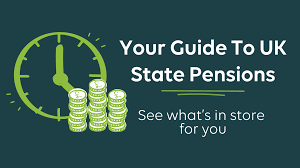If you’re planning your retirement in the UK, understanding the latest pension changes is critical—especially as we approach 2026, when a major update to the state pension system comes into effect. The UK state pension has long served as a financial safety net for millions, providing regular income to retirees who meet specific eligibility criteria. But the upcoming adjustment in state pension age could significantly impact when and how much future retirees receive.
So, what is state pension exactly? It’s a regular payment from the government state pension scheme that individuals can claim once they reach a specific age and have made enough National Insurance contributions. For many, it’s a key part of retirement income alongside private or workplace pensions.
But here’s the pressing question: when do I get state pension under the new rules? Beginning 6 May 2026, the state pension age will gradually rise from 66 to 67. This shift affects anyone born after 5 April 1960, and it could mean delaying your retirement or adjusting your financial plans to bridge the gap.
If you’ve been wondering, what age do I get my state pension, now is the time to check your eligibility and plan ahead. This change will apply across the country, including in state pension England, Scotland, Wales, and Northern Ireland—so it’s a national issue that demands attention.

What’s changing in 2026?
One of the most significant pension changes coming in 2026 is the increase in the state pension age. As part of the UK government’s evolving retirement policy, the pension age will gradually rise from 66 to 67, starting 6 May 2026. This change is part of a broader effort to ensure the long-term sustainability of the pension system as life expectancy increases and more people spend longer periods in retirement.
Current State Pension Age
Right now, the retirement age for claiming the state pension is 66 for both men and women. To qualify, you must have made at least 10 years of National Insurance contributions, and 35 years for the full amount. If you’re wondering, will I get a state pension, this depends on your contribution record, which you can check using the government’s pension forecast tool.
Rising to 67: The 2026 Update
From 6 May 2026, the state pension age will begin to increase in stages, depending on your date of birth. By April 2028, everyone born on or after 6 April 1960 will need to wait until they’re 67 to receive their state pension. This phased implementation means that your retirement age may be pushed back even if you’re currently only a few years away from eligibility.
| Date of Birth | New Pension Age |
| Before 6 April 1960 | 66 |
| 6 April 1960 – 5 March 1961 | Between 66–67 |
| 6 March 1961 onwards | 67 |

Why It Matters
For many, the key concern is how much state pension do I get, and now—when. The delay in access could affect budgeting, savings, and even housing plans. Those who had planned to retire at 66 may now face a 12-month gap in expected income, unless they make alternative arrangements through private savings or part-time work.
If you haven’t already checked your eligibility or payment expectations, it’s vital to get a pension forecast and review your options. With retirement age shifting, even a one-year delay can make a significant difference to your financial future.
Why Is the Pension Age Increasing?
The decision to raise the state pension age from 66 to 67 starting in 2026 is part of a broader effort by the UK government to align its pension policy with the realities of an ageing population. While this may seem like just another round of pension changes, there are deeper reasons driving this shift.
The Government’s Rationale
At the heart of the change is financial sustainability. As people live longer and healthier lives, they spend more years drawing from the state pension system. This puts growing pressure on public finances. The government pension policy is built on the principle that the system must remain fair—not only to current retirees but to future generations of workers who are funding the system through National Insurance contributions.
Increasing the retirement age is seen as a necessary measure to ensure the UK state pension remains affordable over the long term, especially as the ratio of working-age people to retirees continues to decline.
Rising Life Expectancy
One of the main reasons for the change is increased life expectancy. When the state pension was first introduced in 1948, the average life expectancy in the UK was about 68—meaning many people didn’t live long enough to claim it. Today, average life expectancy is well over 80, which means people are drawing pension benefits for 15–20 years or more.
This demographic shift has led policymakers to reassess when individuals should begin receiving their state pension to reflect longer working lives and promote a more balanced system.
A History of Increases
This isn’t the first time the pension age has risen. In fact, state pension age increases have been rolled out in phases over the past two decades:
- 2010–2020: The pension age for women was raised from 60 to 65 to match men.
- 2018–2020: Both men and women saw a rise from 65 to 66.
- 2026–2028: The age will rise again from 66 to 67.
- Future plans: There are already discussions around raising it to 68 sometime between 2037 and 2039.
Each of these pension changes reflects the government’s long-term retirement policy goals—balancing public finances while adapting to a modern society where retirement can span decades.
As the next stage of reform approaches in 2026, it’s more important than ever to understand how these changes could impact your retirement planning, your eligibility, and your financial future.
Who Will Be Affected by the UK state pension changes?
The upcoming UK state pension changes scheduled to begin in May 2026 will primarily affect individuals born after 5 April 1960. If you’re in this group, you’ll likely see your state pension age increase from 66 to 67 before you can start receiving payments.
This shift is being phased in gradually and will directly impact when you can claim your state pension—a crucial consideration for both employed and self-employed workers. Many people are now asking, do I have a state pension, or will I get a state pension under the new system? The answer depends on your National Insurance record and birth date.

Who’s Impacted by the 2026 Pension Age Change?
| Date of Birth | New Pension Age | Eligible From |
| Before 6 April 1960 | 66 | Already eligible or soon |
| 6 April 1960 – 5 March 1961 | 66 + several months | May 2026 onward (phased) |
| 6 March 1961 – 5 April 1968 | 67 | By April 2028 |
These UK state pension changes mean that anyone born after 5 April 1960 will not be eligible to retire at 66 as previously expected.
Groups Most Affected by the UK state pension changes
1. People Nearing Retirement
Those currently aged between 58 and 64 may need to revisit their retirement timelines and consider whether they will face a gap between finishing work and receiving their pension.
2. Women
Historically, women were eligible for the state pension earlier than men, but recent changes have equalized the age. These 2026 reforms reinforce the uniform pension age for everyone, continuing a trend that began in the 2010s.
3. Self-Employed Workers
There’s often confusion about state pension for self-employed individuals. The self-employed can still qualify for the full state pension, but only if they’ve consistently paid Class 2 or Class 4 National Insurance contributions. It’s vital they verify their records using the UK state pension calculator to estimate what they’ll receive and when.
4. Low-Contribution Workers
If you’ve had periods of low or no income (due to part-time work, caring responsibilities, or illness), you may have gaps in your NI record, which could delay or reduce your pension. Again, using the official UK state pension calculator can provide clarity.
If you’re unsure about your current status, it’s strongly recommended to check your state pension forecast online. This tool will help answer questions like how much will I get, when will I get it, and do I have a state pension based on your work history.
Impact on Retirement Planning
The upcoming pension changes in 2026 will have a direct effect on how and when many people can access their state pension. A delayed state pension age means delayed income—forcing individuals to rethink how they’ll fund their early retirement years.
For those who don’t have a robust private pension or workplace pension, the gap year before their new state pension kicks in could lead to financial strain. It’s essential to revisit your pension forecast and evaluate whether your savings will support you until you’re eligible.
Planning ahead is critical. If you’re wondering, when can I get my state pension, the answer now hinges on your birthdate, and possibly even your National Insurance history. Use the UK State Pension calculator or request an official state pension forecast for clarity.
Alternatives and Support Options
Fortunately, there are several ways to bridge the gap before reaching the new state pension age:
- Pension Credit: If your income is low, you might qualify for this government support even before your state pension begins.
- Other State Benefits: Housing Benefit, Universal Credit, or Carer’s Allowance could be temporary lifelines.
- Part-Time Work: Many are now opting for flexible retirement, gradually reducing hours while continuing to earn.
- Deferring Your Pension: If you don’t need it immediately, deferring can increase your payments later—a strategic choice for some.
If you’re unsure which path to take, getting state pension advice from a financial adviser or Pension Wise is highly recommended.
How to Prepare Financially for UK state pension changes
To avoid being caught off guard by these pension changes, consider these steps:
- Get a Pension Forecast
Check how much and when you’ll receive your state pension. This answers key questions like how much will my state pension be and when can I get it. - Boost Your National Insurance Record
You need 35 qualifying years to get the full state pension. If you have gaps, you may be able to make voluntary contributions. - Reassess Your Retirement Age
Adjust your plans if you were expecting to retire at 66. Ensure your savings or additional income sources cover the delay. - Budget for the Gap Year
Calculate what you’ll need during the year-long delay and save accordingly or look for income alternatives.
Controversies and Public Reactions
The 2026 pension changes haven’t been without backlash. Think tanks, unions, and campaigners have expressed concerns over:
- Fairness: Critics argue the system disadvantages lower-income workers and women who may have taken career breaks.
- Health Disparities: Many believe people in physically demanding jobs may not be able to work until 67.
- Clarity: There are calls for clearer state pension advice and better public communication.
The government maintains that the change is essential to keep the system sustainable, but continues to face pressure to soften the impact.
Key Dates and What to Watch For
| Milestone | Date |
| Start of phased pension age increase | 6 May 2026 |
| Full implementation (age 67) | April 2028 |
| Next scheduled review by DWP | Before 2028 |
| Potential future rise to age 68 | Between 2037–2039 |
Keep an eye on upcoming state pension announcements and reviews. The rules could evolve further.
Conclusion
As the UK prepares for another wave of pension changes, early planning is your best defense. Check your state pension forecast, adjust your retirement expectations, and seek state pension advice if needed.
The shift to a later state pension age may be unavoidable, but with the right knowledge and preparation, you can still retire with confidence. Take action now to stay ahead.
Frequently Asked Questions (FAQs) on UK state pension
1. When will the UK state pension age rise to 67?
The state pension age will start rising to 67 from 6 May 2026, with full implementation by April 2028, depending on your date of birth.
2. How do I know when I can get my state pension?
You can check your exact pension age and eligibility by using the official UK state pension calculator on the GOV.UK website or by requesting a state pension forecast.
3. Will I still get a state pension if I’m self-employed?
Yes, self-employed individuals can receive the state pension, provided they’ve paid enough National Insurance contributions over their working life.
4. How much will my state pension be in 2026?
The amount depends on your NI record, but the full new state pension is expected to increase annually. You can estimate it using your pension forecast.
5. Can I claim state pension early?
No, you cannot claim the state pension before reaching the qualifying age. However, other benefits like Pension Credit may help if you’re on a low income.
6. What are my options if I can’t afford to retire at 67?
Consider part-time work, claiming available benefits, or topping up your private pension. Speaking with a pension advisor is also highly recommended.
7. Do I have a state pension if I’ve worked part-time or taken career breaks?
Possibly, but your state pension may be reduced. You need at least 10 qualifying years, and 35 for the full amount. Gaps can be filled with voluntary NI contributions.
8. What happens if I delay claiming my state pension?
If you defer your state pension, you could receive a higher weekly amount when you start claiming. This is often a smart move if you’re still earning elsewhere.
9. Are there any exceptions to the new pension age rules?
Currently, the rise to age 67 applies to everyone. Only certain disability or health-related benefits apply earlier, not the state pension itself.
10. Where can I get official state pension advice?
Visit GOV.UK or speak to Pension Wise for free government-backed guidance. For tailored help, consider a financial adviser.
